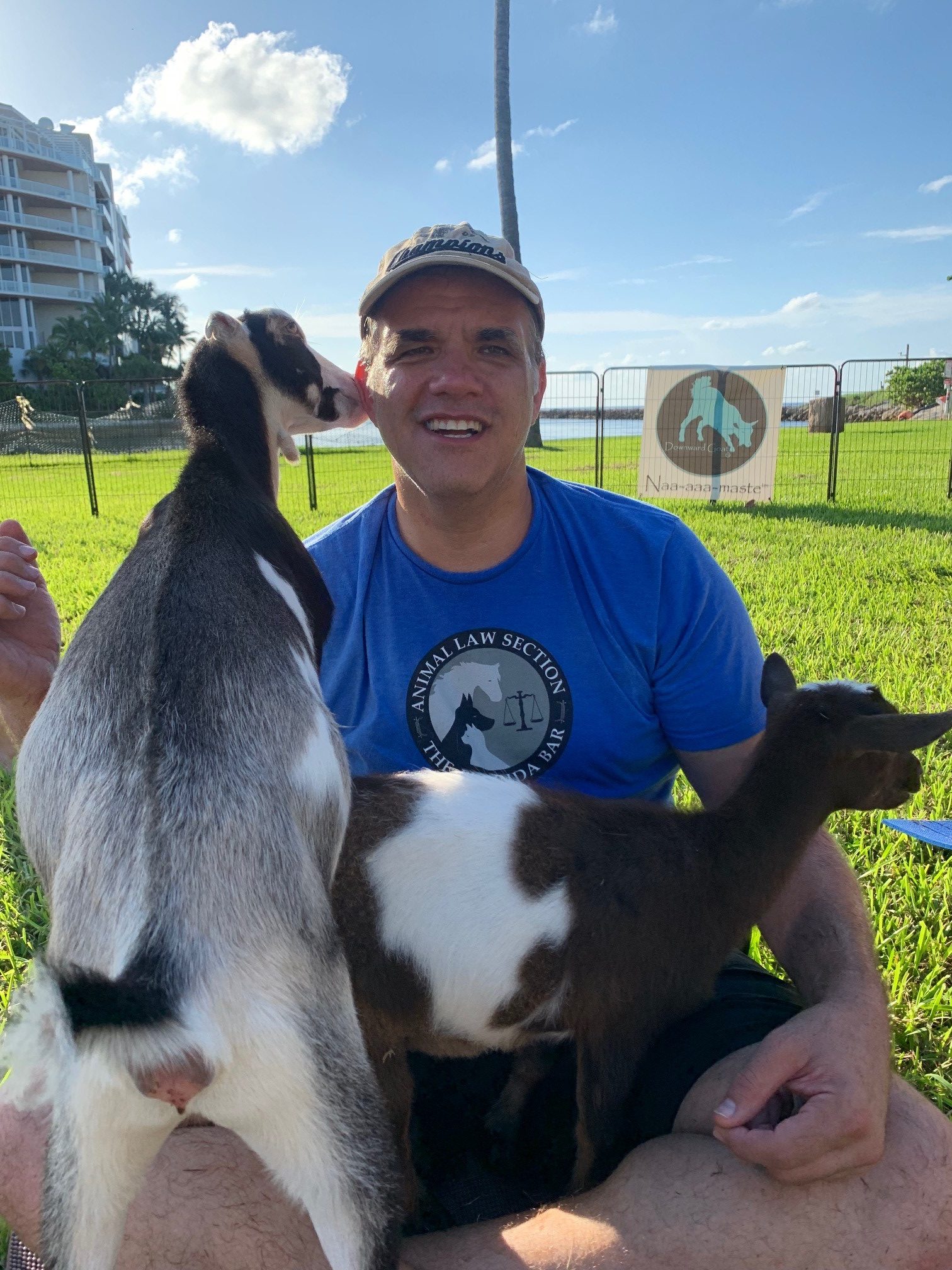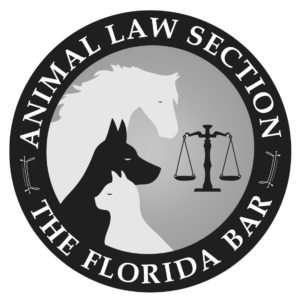Matthew Dietz – New Chair of the Animal Law Section of the Florida Bar

I am so excited and proud to be the Chair of the Animal Law Section of the Florida Bar. At the 2019 Florida Bar Convention, we educated the mind and soul of the membership of The Florida Bar. We taught on substantive issues in Animal Law, and Goat Yoga and our Puppy Pit were phenomenal successes. Primarily, I love animals, and this gives me a great excuse to infuse balance in my life and my practice. Human animal interaction is a great component of willfulness as a busy trial attorney. Goat Yoga and playing with puppies forces one to forget the pressures we all face and take a deep breath and smile.
Substantively, human-animal interaction is older than civilization itself. However, currently most people consider their pets as part of their families, and provide equitable consideration for any animal’s existence in our world. Accordingly, interactions with animals effect more and more people on a daily basis and will have impact on every legal practice. Here are some statistics:
- Pet care spending in 2018 reached a record-breaking high of $72.56 billion compared to $69.51 billion in 2017[1]
- As of December 31, 2016, there were almost 85 million households in the United States with at least one pet, up from nearly 73 million in 2010. 85 million households comprises 68% of U.S. Households.
- The growth in pet households occurred across generations, with the percentage of young adults (ages 18 to 24) that own dogs or cats growing from approximately 44% in 2010 to approximately 53% in 2017, according to Packaged Facts.[2]
- According to Packaged Facts, approximately 90% of dog owners and 86% of cat owners in 2018 considered their pets to be a part of the family[3].
- According to the American Pet Products Association, the census of pets in the United States is as follows (in millions):
Also, the Animal Law section involves more than pets, but also non-domesticated animals, livestock and all other animal-related issues. There are many areas where the legal aspects of animal law which may be obvious. As property, contract law and probate and estate law would be an obvious link with animals – and some would not – such as the effects of bears and peacocks on homeowners associations. Similarly, abuse of animals would be a direct area in which society has protected animals. However, some areas are not so obvious. As a lawyer for children or victims of domestic abuse, there is a well-defined link between child abuse and animal abuse, and in 88% of homes of physically abused children also included abuse and neglect of the family pet. Occasionally, animal abuse is used by the abuser to intimidate a domestic partner or a child.

In my practice as a disability rights lawyer, use of an animals is an accepted aide to assist a person with a disability. There are three categories of assistance animals, service animals, emotional support animals, and therapy or facility animals. (1) Service animals are dogs or miniature horses that are individually trained to work or perform tasks for a person with a disability; (2) Emotional support animals can be any animal that provides emotional support that alleviates one or more identified symptoms or effects of a person’s disability; (3) A therapy dog is an animal that goes to a facility and interacts with persons with disabilities, but is not partnered with a person with a disability.
Furthermore, there is no greater area of controversy than the use of animals as a therapeutic treatment for mental illness or psychiatric disabilities. Today, the value of animal-assisted interventions, including animal-assisted therapy (AAT) is widely acknowledged to alleviate the symptoms of mental illness, such as depression and anxiety. There is currently a body of scientific literature on this topic, and how the companionship increases the release of the hormone oxytocin similar to the release during breastfeeding, labor, sex, but also touch, warmth, and stroking, usually in the context of trusting relationships. The presence of an animal also promotes social integration, responsibility and quality of life. Animal assisted therapies are used to reduce stress or anxiety, provide social support, increase motivation to participate or adhere to a program, and facilitate social interactions. The Florida Substance Abuse and Mental Health (SAMH) Program,[4] recognizes Animal Assisted therapy as stress reducing supports impacting health outcomes for Autism Spectrum Disorder, Posttraumatic Stress Disorder, and other conditions by lowering blood pressure, reducing anxiety, and increasing communication efforts.[5]
As counselors at law, part of our duties is to review the facts and circumstances of each case and determine what is the best and moral, course of action for each client, and many of these cases involve an animal in one way or another. The Animal Law Section provides CLEs and tools to do so. As Mahatma Gandhi said, “The greatness of a nation and its moral progress can be judged by the way its animals are treated.”
So, I am proud to be the chair of the Animal Law Section, and I welcome you to become a member. I would like to thank Downward Goat for providing the yoga class and goat team, and the Humane Society of Broward County for providing the puppy pit!!!
If you want to become a member – the information is here at the Florida Bar Animal Law Section website.
Also, please follow the Animal Law Section on Facebook and Twitter
[1] The American Pet Products Association (APPA) Releases Annual Industry-Wide Spending Figures, March 21, 2019: https://www.americanpetproducts.org/press_releasedetail.asp?id=191
[2] Chewy Form S-1 registration Statement, April 29, 2019.
[3] Id.
[4] See Chapters 394 and 397, Florida Statutes
[5] SAMH Animal Assisted Therapy Research Summary (2014), found at http://www.dcf.state.fl.us/programs/samh/SubstanceAbuse/docs/guidance/Animal%20Assisted%20Therapy%20-%20Research%20Summary%202.24.14.pdf















